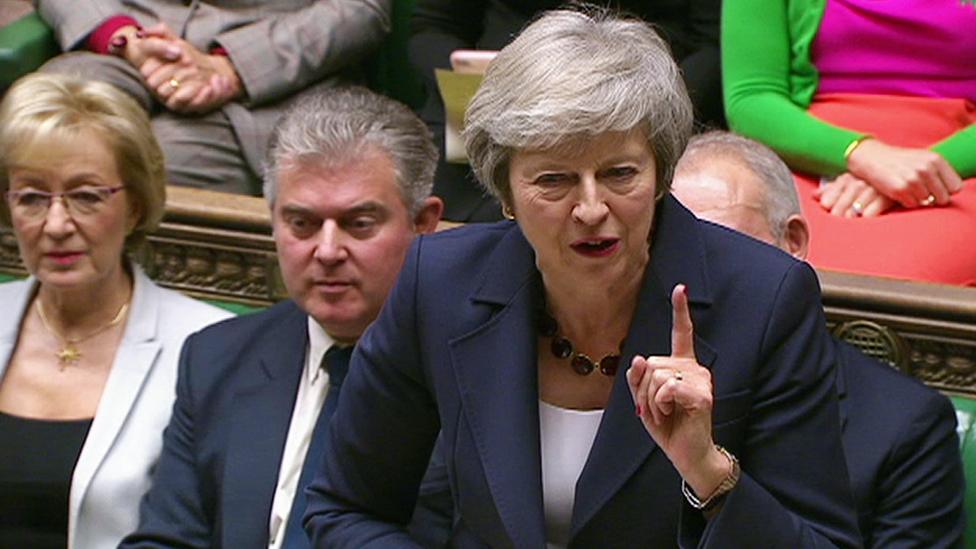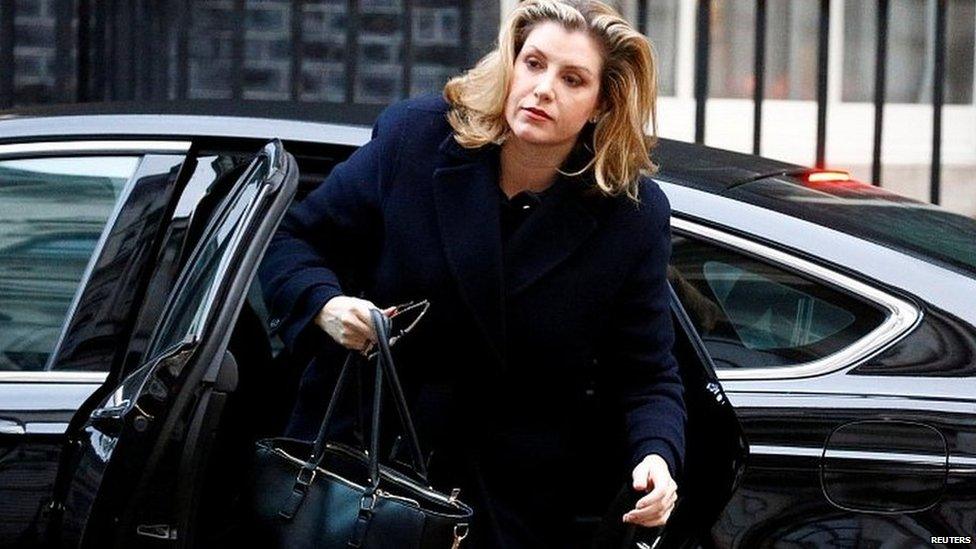Theresa May seeks cabinet backing for Brexit plan
- Published
- comments

A crucial cabinet meeting where Theresa May's most senior ministers debated the draft EU withdrawal agreement has ended.
The meeting inside 10 Downing Street lasted for five hours.
The prime minister is expected to make a statement shortly, with the EU due to publish the withdrawal documents if it gets the green light from London.
Some Tory MPs and opposition parties have already criticised what the agreement is thought to contain.
Earlier Mrs May said it would allow the UK government to take back control of borders, laws and money.
But Labour leader Jeremy Corbyn said the UK would be stuck in an "indefinite half-way house without any real say" over the rules.
Criticism of the draft agreement has focused on ways to prevent a hard border in Northern Ireland.
Some Conservative Brexiteers are angry, claiming it could mean the UK is tied to EU rules for years to come.
Allow X content?
This article contains content provided by X. We ask for your permission before anything is loaded, as they may be using cookies and other technologies. You may want to read X’s cookie policy, external and privacy policy, external before accepting. To view this content choose ‘accept and continue’.
A senior Conservative told the BBC there could be a move to a vote of no-confidence in Mrs May, perhaps as soon as Thursday, although this has not been confirmed. Sources said many Brexiteer MPs were likely to submit letters to the backbench 1922 Committee calling for her to go.
If 15% of Tory MPs (currently 48) do this it would trigger a vote of no confidence.
Meanwhile Northern Ireland's Democratic Unionist Party - which supports Mrs May's government in key votes - warned of "consequences" if there is a deal that "breaks up the United Kingdom".
Crunch cabinet meeting

Penny Mordaunt said nothing as she arrived at Downing Street on Wednesday
The BBC's Norman Smith said the prime minister would seek to head off the threat of any resignations by telling her cabinet ministers that while not perfect, the agreement was as good as it can get.
Downing Street, he added, were pointing to what they view as significant wins, including no separate customs border for Northern Ireland and an arbitration mechanism to ensure the UK can exit the proposed "backstop" customs plan.
Just ahead of the cabinet meeting, all 13 Scottish Tory MPs, including Scottish Secretary David Mundell, signed a letter to the prime minister saying they would not support a Brexit deal that prevents the UK from negotiating its own fishing quotas.
Access and quotas "cannot be included in the Future Economic Partnership" and the UK must leave the Common Fisheries Policy at the end of 2020, they added.
What's been agreed?
The draft withdrawal agreement addresses the Northern Ireland "backstop", which aims to guarantee that physical checks will not be reintroduced at the border with the Irish Republic, in the event of the EU and UK failing to agree a deal on future trading relations that involves not having a physical border.
This has proven the most contentious part of the withdrawal negotiations, with concerns raised by Brexiteer Tories and the DUP over how it will work.
The backstop within the agreed draft is believed to avoid a return to a "hard border" with the Republic by keeping the UK as a whole aligned with the EU customs union for a limited time.
However, some Brexiteers fear this will keep the UK locked into EU trade rules for years.
The agreement also includes commitments over citizens' rights after Brexit, a proposed 21-month transition period after the UK's departure on 29 March 2019 and details of the so-called £39bn "divorce bill".
The future relationship statement is expected to be far shorter, with the UK and the EU's long-term trade arrangements yet to be settled.

What happens next?
If the cabinet signs it off, the EU Commission is expected later to publish the details of the 500-page draft withdrawal agreement as well as the much shorter declaration on future economic and security relations.
Ambassadors from the remaining 27 EU member states will discuss the possibility of organising an emergency summit later this month to sign off on it.
Irish prime minister Leo Varadkar has signalled the summit could take place on 25 November.
If this happens, the government will then face a battle to win Parliament's backing, in a vote the BBC's Laura Kuenssberg said could take place around 7 December.
With some Tories vowing to vote against it and Northern Ireland's Democratic Unionist Party - which Mrs May relies on to win key Commons votes - also expressing concern, it is not clear which way the vote will go.
Brexiteer Conservative MPs were first to criticise the agreement, based on leaks of it, saying it would keep the UK under EU control.
Speaking at Prime Minister's Questions, Peter Bone said the reported agreement would not "deliver" on what people voted for and risked "losing the support of many Tory MPs and millions of voters across the country".
But Mrs May, who is expected to make a statement to MPs on Thursday, said the agreement would leave the UK free to do its own trade deals while the customs union "backstop" would be temporary.
And Conservative Chief Whip Julian Smith said he was "confident" the deal would pass when put to a crucial Commons vote.

Analysis
By BBC political editor Laura Kuenssberg
It doesn't seem to me that many of the cabinet are likely to walk on Wednesday over what's in the document.
It's suggested that those with bigger doubts are more likely to cause problems for the prime minister because it won't get through Parliament.
One source told me senior ministers are thinking not just about the wisdom of backing a deal they don't like because it's a sour compromise, but whether it is folly to back a deal they believe can't get through Parliament.
Slamming on the brakes now would force a crisis, but it could be less serious than the political disaster of pursuing this plan to an eventual calamitous defeat that could take them all down.

What are the parties saying?
MPs react to reports about the draft text of a Brexit agreement
Former foreign secretary Boris Johnson described the reported agreement over the Northern Ireland backstop as "utterly unacceptable to anyone who believes in democracy", and said he would vote against it.
Leading Brexiteer Jacob Rees-Mogg told BBC Newsnight he was so unhappy with the agreement he was considering calling on Mrs May to quit as PM.
The DUP's Jeffrey Donaldson told BBC Radio 4's Today that from "what we have heard... this deal has the potential to lead to the break-up of the United Kingdom and that is not something we can support".
And the SNP's Westminster leader Ian Blackford said the UK was heading towards a Brexit that would "cost jobs" and urged MPs to "think about your constituents' interests, think about jobs, think about prosperity".
But one of Mrs May's allies, former first secretary of state Damian Green, criticised "hyperbole" from people who had not read the document.
And former Conservative leader Lord Hague urged the cabinet to "stick together" - saying the draft agreement contained a "lot of compromises" but would allow the UK to regain control of immigration, fishing and farming.

View from the EU
By BBC Europe editor Katya Adler
What's so striking about this draft Brexit deal the UK media and politicians are all abuzz about, is the marked lack of excitement and/or hysteria in EU circles.
Contrary to the UK narrative, this is not viewed in Brussels as the back-against-the-wall, make-or-break moment.
There's still some time to keep negotiating. EU-UK technical talks are, in fact, ongoing as neither all the "i"s, nor all the "t"s of a deal have yet been dotted or crossed.
The thinking here is: if the UK cabinet or certain EU member states strongly object to specific parts of the draft document (as long as they don't rip up the whole thing), then negotiators can go back to the drawing board.

